
The role of scientific experts in writing a good public health research grant proposal
September 1, 2020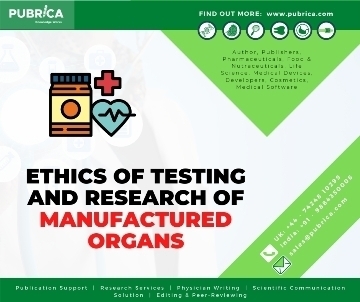
Ethics of Testing and Research of Manufactured Organs
September 8, 2020In brief
- Mediation Analysis as a method to connect the causal-effect relation in being used popularly in Medical writing for clinical research, especially since the last decade.
- The type of Mediation Analysis model is dependent on the needs of the study and each has its own set of advantages and disadvantages.
- Since there is significant heterogeneity in the manner it is used, there is need for methodological uniformity.
Keywords
Scientific Medical Writing Companies, Medical Writing In Clinical Research, scientific research paper writing, Medical Writing for Clinical Trials, Medical Writing in Clinical Trials, Clinical Research Services, Medical Writing CRO, research paper writing service, Medical Writing for Clinical research, research paper writing help, Scientific Writing Help, clinical medicine research, medical research companies.
What is Mediation Analysis?
Mediation analysis (MA) is a form of statistical analysis and is very commonly used in epidemiology, psychology, sociology, and medicine by Scientific Medical Writing Companies. It attempts to predict the relation between the antecedent variable and the outcome variable by Clinical Research Services. In other words, Medical Writing in Clinical Research use MAto try and find methodology by which outcome is related to exposure. Thus, it is useful in both interventional and observational studies while scientific research paper writing or Medical Writing for Clinical Trials. Research paper writing help use mediation model as a causal model where mediator is presumed to cause the effect, while the vice versa is not true. So, wherever the presumption is not correct, MA is not useful. Statistics is used to evaluate whether the presumption of the MA is correct or not.
Scientific writing help use this information while research paper writing and it is useful to find the association with causation. This helps understand the disease aetiology better and this information is used to improve or alter existing treatment and management modality.
Classification of Mediation Analysis Methodology
There following are the methods used in MA:
- Traditional approaches Single measure: – In this method, separate regression models are used for the antecedent and the outcome variable in clinical medical research. E.g. Baron and Kenny’s framework is commonly used by Medical Research Companies. X is the causal variable and Y is the outcome in the absence of any mediation as per the below representation. Path C is the total effect.

Mediating variable M in the below figure is the process or intervention variable. Path C´ in this figure is the direct effect. When the path from X to Y is reduced but above zero, there is partial mediation, while when C´ becomes zero, there is complete mediation.
There are four steps in the Baron and Kenny’s model in establishing mediation.
Step 1: – To show that the antecedent variable correlates with the outcome variable.
Step 2: – To show that the antecedent variable correlates with the mediator.
Step 3: – To show that the mediator affects the outcome variable.
Step 4: – To establish that the mediator completely mediates the causal- effect relationship.
Total effect = direct effect + indirect effect OR
C = C´ + ab
Complete mediation is proved when all the four steps are met, while partial mediation is indicated if Step 4 is not met.
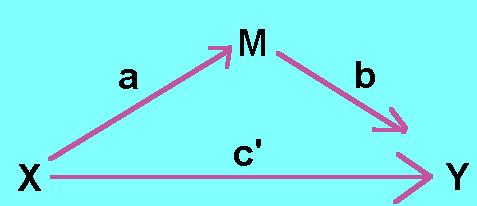
- Counterfactual approaches Single mediator: – Lewis’s 1973 counterfactual analysis is based on the understanding that, if an antecedent event is the complete causal factor for the effect, then, there would not be the effect if there is no antecedent event. Medical Writing CRO use different regression models for the antecedent and the outcome. Causal contrast is highlighted between the exposed and the non-exposed.
In the causal-effect model, when there are multiple mediators that need to be evaluated, one can consider one mediator at a time. This is possible only when mediators do not affect each other. However, if we need to evaluate several mediators simultaneously or in cases where mediators affect each other, we need to use either parallel or serial MA.
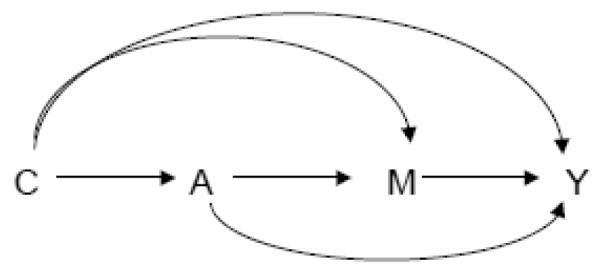
Mediation with single mediator M, A is exposure, Y is the outcome and C is the confounder.
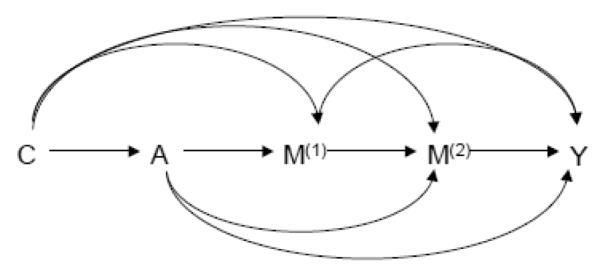
Mediation with two mediators M(1), M(2), A is exposure, Y is outcome and C is the confounder.
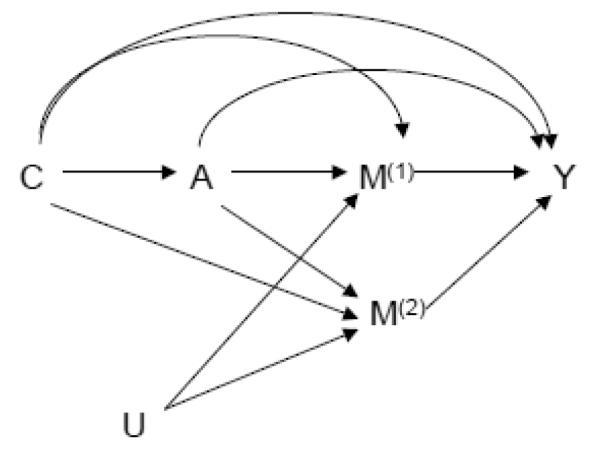
Mediators with unknown common cause, where mediators do not affect each other.
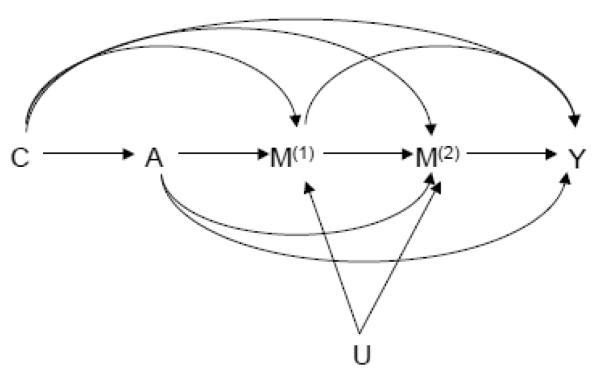
Mediators with unknown common cause, where mediators affect each other.
- Parallel mediators: Medical Writing for Clinical research uses parallel multiple mediators that need to be evaluated at the same time. Regression model is used for all mediators and separate models are used for different mediators.
- Serial or sequential Mediation: – Serial mediation is used when mediators act one after the other for the outcome or the chain reaction.
An example of a sequential MA is a survey study conducted on Chinese university students linking indicators of career adaptability in the context of changing job scenario and challenges faced by Chinese university students while seeking jobs or building their careers.
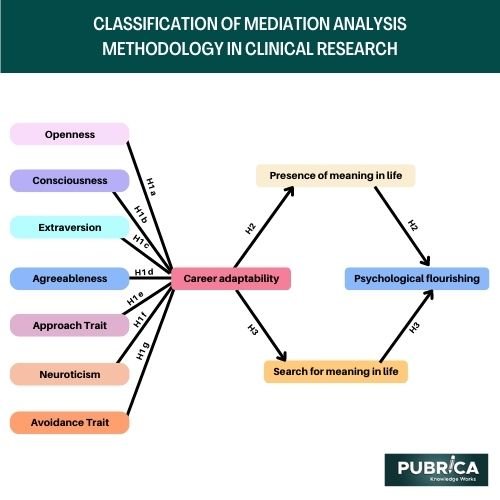
The road ahead
MA is based on strong assumptions that need to be discussed to avoid misinterpretations. Planning MA in advance is preferred as it helps in adjusting in the methodologies to account for appropriate sample size, key confounders, and measurement errors in mediators. There is considerable heterogeneity in the planning, conduct and reporting of MA, necessitating the need to have uniform and consensus-based guidelines on the methodology.
Conclusion
MA is a statistical technique which is being used increasingly by Research Paper Writing Services and Medical Writing in Clinical Trials. There is no single approach to MA, researchers may or may not have a prior hypothesis. Scientific research writing help may focus on direct or indirect antecedent causal evidence or association-based studies. Each model of MA has its own advantages and disadvantages and the model chosen depends on the type of study.
References
- MacKinnon, D. R., Kisbu-Sakarya, Y., & Gottschall, A. C. (2013). Developments in mediation analysis. In T. D. Little (Ed.), Oxford library of psychology. The Oxford handbook of quantitative methods: Statistical analysis (p. 338–360). Oxford University Press.
- VanderWeele, T. J., & Vansteelandt, S. (2014). Mediation Analysis with Multiple Mediators. Epidemiologic methods, 2(1), 95–115.
- Zhuang Mingke, She Zhuolin, Cai Zijun, Huang Zheng, Xiang Qian, Wang Ping, Zhu Fei (2018). Examining a Sequential Mediation Model of Chinese University Students’ Well-Being: A Career Construction Perspective. Frontiers in Psychology, 9, 593.
- Tat-Thang Vo,Cecilia Superchi,Isabelle Boutron,Stijn Vansteelandt (2020). The conduct and reporting of mediation analysis in recently published randomized controlled trials: results from a methodological systematic review. Journal of Clinical Epidemiology,117,78-88.
